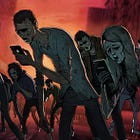Finding Love & Connection in the Digital Age
A meditation on the success of OnlyFans and the failure of dating apps to foster human connections.
Introduction
Being a human has always been challenging, I imagine. Our forefathers’ forefathers may have dealt with some of the same issues we face today. Yet, the IT economy has created a brand new host of problems that are unique to the times we live in. AI, both as a technology and a cultural phenomenon, may add another layer of complexity to the historically unique issues we are already facing.
For example, studies show that people are having less sex by the year, especially young people. As a result, fewer children are born. The global fertility rate in 2023 was 2.3 children per woman in 2023 compared to 4.9 children per woman in the 1950s. In particular, sexlessness among young men between 22-34 years old has roughly doubled over the last ten years. A study shows that in 2018 nearly 1 in 3 young men in the US between 18-24 reported no sexual activity in the last year which to our knowledge has not happened before before in human history.
Simultaneously, the internet porn industry is booming. OnlyFans had 305 million registered fan accounts in November 2023 and this number is certainly much higher today. The top female creators on the platforms earn millions of dollars in the two digits often for showing off their bodies to the camera and flirting with strangers they can’t see. A UK regulatory finding reveals that gross payments made through the OnlyFans platform (gross in more than one way) increased by 19% between November 2022 and November 2023, jumping from $5.55 billion in 2022 to $6.63 billion in 2023.
We can’t find data that proves a connection between the success of OnlyFans and the fact that people are having less sex. This is the exact same issue as proving that a screen-based childhood causes the mental health crisis among teens. “Causation does not equal correlation” whispers scholarly voices from the height of ivory towers. Even if there is a connection it’s hard to tell if the chicken came before the egg. For example, are people having less sex because of pornography, or are people watching more pornography because of less sex? Either way, from looking at the data it’s hard not to draw the conclusion that online sex is substituting physical intimacy.
From OnlyFan's perspective, this is great news. For BigTech this is great news too. More substitution of real life means more screen time, more clicks, and more predictable advertisement revenue. We can discuss endlessly why OnlyFans has become so popular and what society should do about it. A hardcore feminist might say that too many men are animalistic, abusive, and bad at impulse control. Someone from the manosphere/Andrew Tate camp would probably scorn the male fans for being weak, pathetic and deserving of being tricked by the female creators. More moderate voices will advocate for the rights of women to express themselves, or take sides with the (mainly) male fanbase who use the platform as an escape from marital issues or loneliness.
In the end, none of these opinions matter. The fact remains: the major financial wheels that are turning the US economy and by extension the world economy seem to be misaligned with humanity’s best interest - which in this specific case is authentic human connection, intimacy, and reproduction.
If you ask the powers who have created these new problems, the answer is a technological fix. Including a lot of help from AI. A person who believes so, and who has also been instrumental in normalizing the behavior of meeting strangers via algorithms on dating apps, is Whitney Wolfe Herd.
As evident from a recent in-depth interview with The New York Times, Herd remains a strong believer in finding love through technology. I think she is correctly diagnosing some of the underlying issues that the dating apps and users are facing but she also tends to overestimate AI’s potential as a redeemer. We shall discuss later that the whole idea of pursuing connection and love through social media and apps is very, very tricky. Before we get into that, let’s briefly read about Herd’s backstory for context.
Whitney Wolfe Herd
Whitney Wolfe Herd was an important part of Tinder’s early growth. She was hired as the VP of Marketing as one of the company’s first employees. As a 22-year-old, Herd was pilgrimaging sororities, trying to convince the most attractive girls she could find to sign up for the Tinder app. Hereafter, she went over to the fraternities and pitched the app to the most attractive guys she could find, telling them that Tinder was a great way to meet hot chicks.
During the same time, Herd was dating her boss, Justin Mateen who is one of Tinder’s three official co-founders and known as somewhat of a “social butterfly”. Mateen’s best friend, co-founder and Tinder’s first CEO, Sean Rad, describes in an interview that “the entire planet is connected by at least three degrees to Justin.” While Herd was doing the groundwork at college campuses, Mateen leveraged his social large network in California and beyond to promote Tinder. As we know, the early marketing efforts paid off big time - the small flame caught fire and spread throughout the world.
While Tinder had become a new and popular way for couples to meet in many locations, Herd and Mateen went through an ugly breakup which forced Herd to leave the company. After resigning, Herd filed a lawsuit against Tinder for discrimination and sexual harassment. The suit was settled a few months later out of court reportedly for $1 million plus stock in the company. While Mateen departed the company, there was not any admission of wrongdoing by Tinder or its executives as part of the settlement.
The toxic relationship with Mateen, the chauvinistic tech bro culture at Tinder, and the overall humiliating experience of working there, became Herd’s fuel and fire to create a competing but “feminine-first” dating and friends app. One key way Bumble differentiated itself from competitors was that only women could send the first message to heterosexual matches. In February 2021, Herd took Bumble public as the youngest woman ever to take a company public at age 31. The stocks surged on its opening day and Herd became a billionaire.
In January 2024, Herd stepped down as CEO and was succeeded by the former CEO of Slack, Lidiane Jones. Now, effective from mid-March of this year, Herd is back at the steering wheel as CEO of Bumble, taking over a company that is not in great shape. Four years after Bumble’s listing, the company has lost more than 92% of its value. The downturn coincides with a larger trend of post-pandemic "dating app fatigue", which is especially pronounced among Generation Z.
Whitney Wolfe Herd’s Vision
Last year, Herd was interviewed onstage by Bloomberg Tech where she discussed Bumble’s mission:
“I’m looking at Gen Z now and I’m looking at an insanely large TAM [Total Addressable Market] of singles around the world. Loneliness is on the rise. It is actually one of the biggest issues humanity is facing right now, I mean, according to the Surgeon General and top doctors, loneliness is actually killing us. And social media, while it has benefits, it is not social media it is anti-social media. And so, I think there is something really powerful about the technology we are building to really connect us. Go online, to get offline. And that is going to be absolutely critical for the next generation, the current generation, and for bringing us closer together.”
Further, Herd stipulates that Bumble can use AI to create more healthy and equitable relationships through better match-making, and AI dating coaches can both be an outlet for users to share their insecurities and dating struggles and help to improve their profiles. Herd even imagines a future where “AI dating concierges” can go out on dates for users. However, in a few years’ time, Bumble will not be a dating app.
“Dating will be a component but we will be a true human connection platform. This is where you will meet anyone you would want to meet. A hiking buddy, a mahjong buddy, whatever you are looking for. Anyone you are looking for for community. If you are going through something tricky. You’ve gotten a bad diagnosis, you don’t know anybody. You should be able to go to Bumble and find someone going through shared struggles and shared joys. That’s what the future is going to be”
Herd’s vision of the future is one where you can go on an app and find a person for whatever purpose you want. Whether it’s for comfort, sex, friendship, or playing mahjong, Bumble got you covered and will help you to order that person like a food delivery. Herd’s underlying assumption is that meeting people, dating people, and forming and maintaining relationships should be effortless. With strong enough AI, Bumble can identify the right people for you to meet, whatever you are into. Also, when you actually meet through the app, you will certainly have an amazing time, because the AI says you are compatible.
Here's the problem with all of this. Anyone who has ever spent time with people knows that humans are rarely effortless to spend time with. Frankly, people often suck. The more you spend time with them, the more annoying they tend to become, and the more challenging it is to love, let alone to like them. That is because other people have their own needs, personalities, ways of seeing things, mood swings, sleep patterns, then they sweat, shit, get sick, and eventually become old and die. All of this is very unsatisfying and annoying to the rational, system-optimizing part of the brain. Real humans are nothing like the ever-living, ever-satisfying, picture-perfect avatars on the screen that never confront us with insecurities in the way people with real needs do.
People prefer OnlyFans over dating apps for this very reason. Rational people cannot dispute that men and women relate differently to sex and relationships. Mainly men fall in love with OnlyFans models and engage in purely online sugar dating while it’s mostly women who enjoy the non-physical sexual attention and showering of gifts. However, both heterosexual men and women gain something from the interactions on OnlyFans that they don’t get from spending time with real humans in real life.
Herd looks at the large share of singles in the world and sees a huge market opportunity. But she is misreading the market. People are not looking for other people to be with. They want to either be or be with, a perfect digital avatar, one that is unrestrained by human limitations. Such is the world that the digital economy is creating.
As a reminder to free subscribers, you can currently become a paying subscriber and support my work for only $30/year. In return, you will get weekly pieces about human rights and IT, full access to my backlog of +130 posts, an e-book before the end of this year, occasional podcast episodes, and my eternal gratitude 👇





